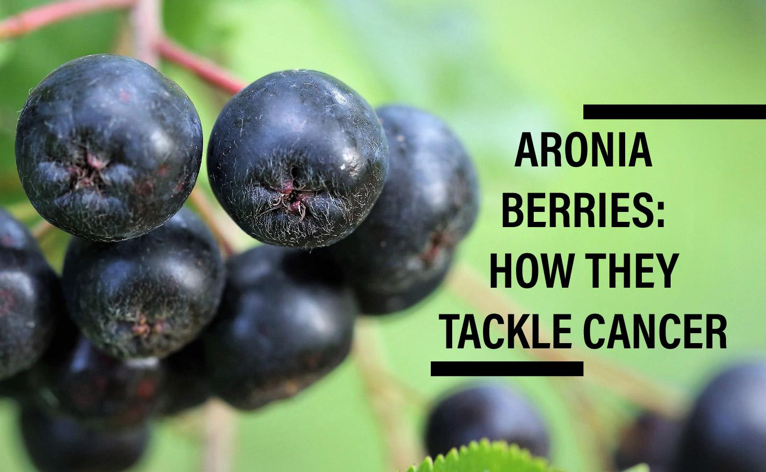Tackling Cancer: The Top Aronia Berry Property

Last week, we discussed specific chemicals in the Korean black raspberry, which possesses anti-cancer properties. More specifically, the Korean black raspberry is packed with antioxidants[1]. The aronia berry (also known as the chokeberry), on the other hand, has more than that – This berry contains antioxidant, anti-cancer, and anti-platelet properties[2].
Aronia Berries are also very similar to the Black Raspberries as they are also rich in anthocyanins[3]. The antioxidant ability of anthocyanins has been proven to reduce the risk of some diseases[4]. For example, the aronia berry has proven to be the best in reducing colon cancer cell growth[5]. This is closely linked to its anti-cancer properties as well! The anthocyanins in aronia berries tend to cause cancer cells to die by triggering their death, also known as cell apoptosis[6]. Also, multiple studies have shown that aronia berries protect our bodies from colon and gastrointestinal cancer[3].
In terms of anti-platelet activity, the aronia berry has shown promise in reducing the risk of breast cancer[7]. Basically, the platelets in patients with breast cancer are abnormal, causing the production of Reactive Oxygen Species (ROS). ROS are responsible for causing damage to RNA, DNA, and proteins, which may eventually lead to certain forms of cancer[8]. By lowering platelet activity in the carcinogenic region, this may reduce both oxidative stress and subsequent DNA damage that is key for cancer cell development[8].
All in all, it is important to remember that we live in the 21st Century – Life expectancy is on the rise and as we age, the odds of developing mutated cells are increasing as well. To better protect ourselves from these malignant cells, we can eat specific food that contains anti-cancer properties (and this is where the berries come in)!
As mentioned before, the aronia berry has similar properties to the Korean black raspberry. However, the aronia berry (available at: https://www.idoori.com/category/aroniaberry) appears to target a few different types of cancer as it has a different chemical composition. So, including one or the other (or both types of berries) in your diet could be the step you need to take in reducing the chance of cancer cell development. While it is not foolproof, remember that even the slightest improvement in odds is worth it if the result is a cancer-free life. Both of these nutritious berries are available in the form of juice in our store (on sale today)!
The information contained in the post is for general purpose only and should not be considered as medical advice.
[1] Nile, S. H., & Park, S. W. (2014). Edible berries: Bioactive components and their effect on human health. Nutrition, 30(2), 134–144. doi:10.1016/j.nut.2013.04.007
[2] Yaneva, M. P., Botushanova, A. D., Grigorov L. A., Kokov, J. L., Todorova, E. P., & Krachanova, M. G. (2002). Evaluation of the immunomodulatory activity of Aronia in combination with apple pectin in patients with breast cancer undergoing postoperative radiation therapy. Folia medica. 44. 22-5.
[3] Savouret, J., & Quesne, M. (2002). Resveratrol and cancer: a review. Biomedicine & Pharmacotherapy, 56(2), 84–87. doi:10.1016/s0753-3322(01)00158-5,
[4] Lala, G., Malik, M., Zhao, C., He, J., Kwon, Y., Giusti, M. M., & Magnuson, B. A. (2006). Anthocyanin-Rich Extracts Inhibit Multiple Biomarkers of Colon Cancer in Rats. Nutrition and Cancer, 54(1), 84–93. doi:10.1207/s15327914nc5401_10
[5] Kulling, S., & Rawel, H. (2008). Chokeberry(Aronia melanocarpa)– A Review on the Characteristic Components and Potential Health Effects. Planta Medica, 74(13), 1625–1634. doi:10.1055/s-0028-1088306
[6] Kedzierska, M., Olas, B., Wachowicz, B., Stochmal, A., Oleszek, W., Jeziorski, A., … Glowacki, R. (2009). An Extract from Berries of Aronia Melanocarpa Modulates the Generation of Superoxide Anion Radicals in Blood Platelets from Breast Cancer Patients. Planta Medica, 75(13), 1405–1409. doi:10.1055/s-0029-1185718
[7] National Cancer Institute, U.S.A. (n.d.). NCI Dictionary of Cancer Terms. Retrieved from NIH National Cancer Institute: https://www.cancer.gov/publications/dictionaries/cancer-terms/def/reactive-oxygen-species
[8] Malik, M., Zhao, C., Schoene, N., Guisti, M. M., Moyer, M. P., & Magnuson, B. A. (2003). Anthocyanin-Rich Extract From Aronia meloncarpa E. Induces a Cell Cycle Block in Colon Cancer but Not Normal Colonic Cells. Nutrition and Cancer, 46(2), 186–196. doi:10.1207/s15327914nc4602_12







